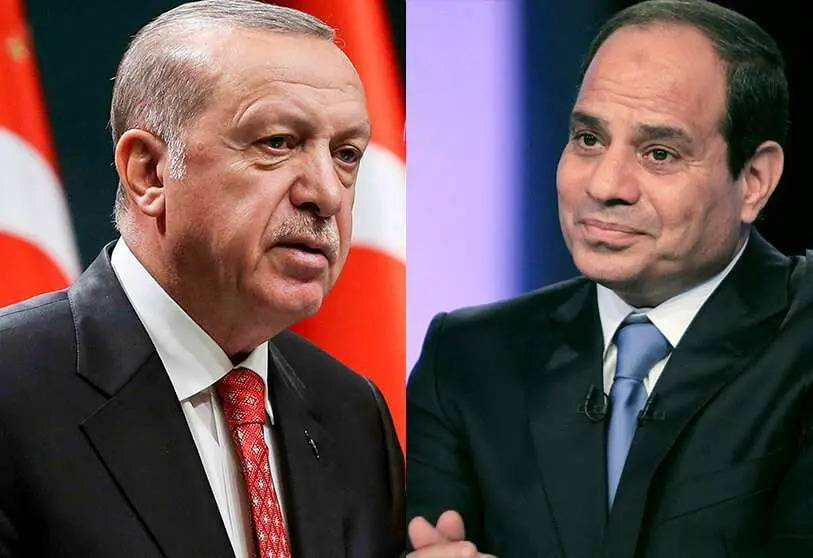Turkey and Egypt build bridges after a decade of antagonism

The geopolitical order in the Middle East promises to take a 180-degree turn in the coming months. Structural changes in the region open the door to future détente after a decade of open hostility. A clear example of this is the political shift in Turkey, where numerous internal problems have forced the Ottoman president, Recep Tayyip Erdogan, to design a new external roadmap capable of integrating some of his regional neighbours with whom he has had strong disagreements.
One of the key players in this equation is Egypt. The overthrow in 2013 of the Muslim Brotherhood leader and close ally of the Turkish leader, Mohamed Mursi, at the hands of the then defence minister, Abdel Fattah al-Sisi, opened a chapter of deep disagreements between Ankara and Cairo that have been 'in crescendo' over the past eight years. Disagreements that seem to be a thing of the past. At least that is the intention expressed by both countries after holding their second summit since the complete disappearance of the Islamists in Egypt.

A delegation led by the Egyptian deputy foreign minister, Hamdi Sanad Loza, travelled to Ankara on Tuesday for a new bilateral meeting with his Turkish counterpart, Sedat Önal, accompanied by senior government officials. The interlocutors set the timetable for a meeting that covered various topics, but which was aimed at bringing the two administrations closer together. At the previous meeting, held on 5 May in Cairo, the foundations for the thaw were laid in what was the first contact in almost a decade.
"Frank and deep". This is how both sides described the Cairo round of talks. The two countries are showing positive signs of rapprochement, especially Turkey, a priori the most interested party. The foreign minister, Mevlüt Çavuşoğlu, was optimistic after the second meeting and told the NTV radio station that "steps would be taken to appoint a new ambassador" in the event of progress in the negotiations. Çavuşoğlu stressed the "positive measures" implemented by the Ottoman government to improve relations with its neighbours, adding that in international relations "there is no lasting friendship or enmity".

Egypt, however, opts for caution. The al-Sisi regime has better cards in the game given Ankara's regional isolation. In any case, the North African country would jeopardise its relations with Greece and Cyprus if it went too far with Turkey. For this reason, the Egyptian autocrat will demand a series of concessions from Erdogan while at the same time marking distances, as he did in July. At that time, the foreign ministry issued a statement condemning the reopening of the Cypriot town of Varosha, located in the Turkish-occupied northern part of the country. A message of reassurance to its partners in eastern Mediterranean waters.
Reconciliation between Cairo and Ankara depends first and foremost on healing the scars caused by the Arab Spring, the 2011 revolutionary outbreak that changed the regional order. The uprisings against the regimes in Tunisia, Libya, Syria, Bahrain and Yemen also reached Tahrir Square, in the heart of the Egyptian capital, from where pressing popular pressure eventually toppled Hosni Mubarak. In this impasse, Erdogan saw a golden opportunity to take control in the region and impose his agenda.
The leader of the Justice and Development Party (AKP) had just won his third consecutive victory at the polls and was experiencing his political heyday. He embraced the uprisings, a strategy that angered the Gulf monarchies as a serious threat to their stability, and shifted his foreign policy away from a neutral role close to his NATO partners to become a regional leader.

To this end, Erdogan established ties with Islamists in Egypt and successfully promoted his candidacy in Egypt's 2012 elections. A bid to turn the Turkish-Egyptian axis into the dominant regional actor proved unsuccessful following the Egyptian army's coup of the Muslim Brotherhood's mandate in the same year that Erdogan faced a popular uprising against him. In fact, one of al-Sisi's demands is the extradition of 10,000 militants of the Islamist organisation resident in Turkey, a group considered "terrorist" by Cairo.
The disagreements between the two have been amplified after backing different factions in the Libyan civil war. It has also fought against Saudi Arabia and the United Arab Emirates, countries it also seeks to draw closer to. Riyadh made a normalisation of relations between Ankara and Cairo a condition for improving ties with Turkey. Erdogan's interference through support for political Islamism must stop.

The Turkish government's strenuous efforts to restore bilateral relations with its neighbours are part of an underlying strategy to mitigate its regional isolation. The lack of partners, the dispute over hydrocarbons in Mediterranean waters, galloping inflation and the devaluation of the lira put Erdogan on the ropes, in a position of extreme weakness. In this context, the Turkish leader is betting on a new foreign policy based on pragmatism that even abandons the fundamental precepts of the ideology that has been the backbone of his presidency so far.
Behind closed doors, Erdogan is advancing his Islamist agenda and maintaining the government thanks to the backing of the Nationalist Action Party, a party that defends the Blue Homeland Doctrine, a theory that extends Turkish sovereignty from the Black Sea to the eastern Mediterranean across the Aegean. Outwardly, Erdogan is building bridges with his neighbours after cutting off support for Islamist movements.








